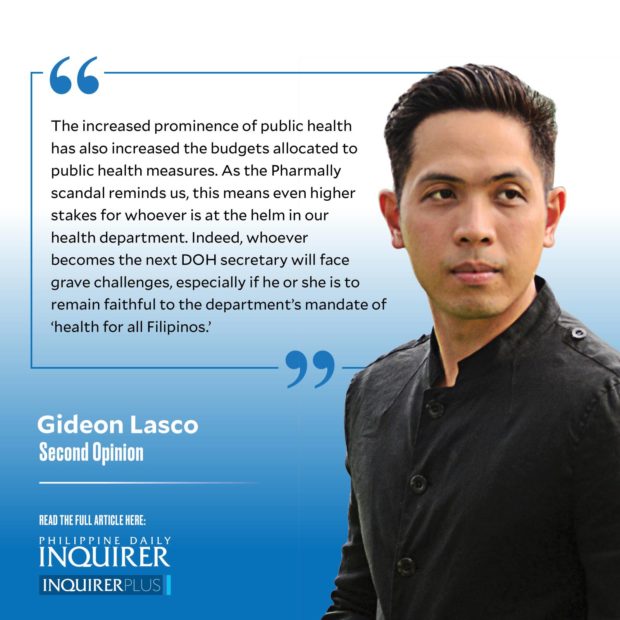With the advent of COVID-19, the Department of Health (DOH) has emerged as one of the most important portfolios in government. In the name of public health, various aspects of our lives have been radically altered—from education and work, to tourism and recreation. More so, health-related policies have taken on a greater political significance, leading many politicians to engage in what we have called “medical populism”: the resort to dramatic, simplistic, and divisive responses during times of health crisis.
The increased prominence of public health has also increased the budgets allocated to public health measures. As the Pharmally scandal reminds us, this means even higher stakes for whoever is at the helm in our health department. Indeed, whoever becomes the next DOH secretary will face grave challenges, especially if he or she is to remain faithful to the department’s mandate of “health for all Filipinos.”
The first of these challenges is to address the still-ongoing pandemic. Alas, amid the ever-present threat of further variants and surges, many Filipinos remain unvaccinated, and we have not fully embraced an outdoor-centric paradigm, despite the strong evidence that it is the best way forward. Can we have a DOH secretary who does not view the world as a hospital, and does not think that clinical expertise is the only one that counts?
The second is seemingly contradictory to the first, but is, in fact, complementary, and that is to address the numerous health challenges that have been somewhat set aside during the pandemic. To name just a few, these include the mental health crisis, especially among young people; the rise of noncommunicable diseases like hypertension and diabetes; the persistence of infectious diseases like tuberculosis and HIV; and the emergence of other health threats like monkeypox and beyond. And what of tobacco, which continues to kill far more Filipinos than COVID-19?
The third is key to succeeding in the first two challenges: the ability to maintain technical independence in pushing for evidence-based policies. As we have seen in the pandemic, political pressure can undermine public health, not least by promoting baseless measures like face shields as prevention, rapid antibody tests as diagnosis, and ivermectin as treatment. If Ferdinand Marcos Jr. were to demand the revival of the “nutribun” program, for instance, will the new DOH secretary be able to make a decision based on evidence? And if the new administration were to continue the drug war, will he or she be able to insist on humane and scientific alternatives?
Fourth, the next DOH secretary should recognize the role of the health department as the agency that protects the interests of the health workforce. Alas, many health workers felt abandoned during the pandemic with the nonprovision of personal protective equipment, nonpayment of hazard pay, as well as the seeming reticence on the part of the DOH to more vigorously defend health care workers (HCWs) like Dr. Naty Castro amid Red-tagging, violence, and harassment.
Fifth, mindful of the decentralized nature of our governance, the DOH secretary must work with local government units toward a stronger primary care approach. In our own researches (see Mallari, et al., 2020), we saw the untapped potential of barangay health workers in health promotion, and surely there are many other innovations at the local level that can be scaled up. If we are to meet our country’s health needs, we also need more medical and allied health schools, equitably distributed throughout the country.
Finally, and I believe most importantly, the next DOH secretary will have to regain the trust and confidence of the Filipino people. Deservedly or undeservedly, public trust on the health department has taken a toll due to various issues, some even before the pandemic (e.g., the Dengvaxia scandal and the PhilHealth anomalies). To regain this trust, the next DOH must lead efforts toward accountability and transparency.
In fairness to the people within DOH, efforts have been made to address some of the above challenges, alongside improving health infrastructure and updating our health surveillance capacity. With various social media pages, telemedicine services, and the Healthy Pilipinas website, the DOH today has much more online presence. The DOH has also pushed for active transport—including bike lanes—and has started programs to improve the mental health of HCWs. And while imperfect, the Universal Health Care Act provides a strong mandate to make decisions through evidence and consensus, strengthen referral systems, and realize (and spend for) health as a right.
But much more work needs to be done—and the Filipino people deserve a public health leader who is up to the challenge.
—————-
glasco@inquirer.com.ph
